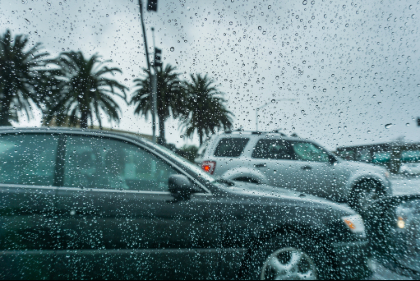INDEPENDENT DEALER
Apopka, FL | (321) 230-6958
OUR BLOG
Florida drivers, don’t wait for the storm! Learn essential hurricane vehicle preparation tips to ensure peace of mind. This post from Ken Reaser Enterprises in Apopka, FL, has you covered.

Living in Florida means hurricane season is just part of life. But here's the thing: your car can either be your lifeline during a storm or leave you stranded when you need it most.
The good news? Getting your vehicle storm-ready doesn't require a mechanical engineering degree. With proper hurricane vehicle preparation, you can have confidence that your car will perform when you need it most.
Let's walk through the essential steps that'll keep you moving when Mother Nature throws her worst at us.
This hurricane season, preparation is everything. Call Ken Reaser Enterprises in Apopka, FL, at (321) 230-6958 to get expert advice and AMSOIL products that keep your vehicle storm-ready. For extra convenience, shop AMSOIL’s online store to stock up fast!
Start with the Basics: Your Pre-Storm Checklist
Hurricane vehicle preparation begins long before you see that first swirling mass on the weather map. Think of it like preparing for a big trip – except this trip could literally be a matter of life and death.
First up: your tires. You know those treads you've been meaning to check? Now's the time. Bald tires and standing water don't mix well, and hydroplaning during an evacuation isn't on anyone's bucket list. Check your air pressure too – Florida's heat and humidity can mess with tire pressure more than you'd think.
Your battery deserves some love as well. Nothing kills a battery faster than our sweltering summers followed by sudden temperature drops. If your battery is pushing three years old or takes a few extra cranks to start, replace it now. Trust me, you don't want to discover a dead battery when you're trying to evacuate.
Storm Season Car Maintenance That Actually Matters
Here's where we get real about Florida weather vehicle protection. Your car's fluids are like your body's blood – they need to be fresh and flowing properly when stress hits.
Check your oil, coolant, brake fluid, and windshield washer fluid. That last one might seem minor, but when you're driving through sheets of rain with debris flying around, you'll want crystal-clear visibility.
Pro tip: Switch to high-quality synthetic oil if you haven't already. It handles extreme conditions better than conventional oil, and during hurricane season, your engine faces plenty of extreme conditions.
From scorching heat to stop-and-go hurricane traffic, your engine deserves the best protection. Trust AMSOIL Signature Series 5W-50 100% Synthetic Motor Oil from Ken Reaser Enterprises in Apopka, FL. Call (321) 230-6958 or shop AMSOIL’s online store to prepare your vehicle today.
Build Your Vehicle Emergency Kit Essentials
Your emergency kit isn't just a box of random stuff thrown in your trunk. It's your survival insurance policy. Start with the absolute must-haves: water (one gallon per person), non-perishable food, a first-aid kit, flashlight, batteries, and blankets.
But don't stop there. Add jumper cables, basic tools, duct tape, and a tire pressure gauge. Throw in a portable phone charger – your cell phone is your connection to the outside world when everything else fails.
Most people forget to keep copies of important documents in waterproof bags: insurance papers, registration, ID, and emergency contact numbers. Having these handy can save hours of headaches when dealing with post-storm chaos.
The Fuel Game: Stay Ahead of the Rush
Every Florida resident knows the gas station panic that hits when a hurricane approaches. Lines around the block, stations running dry, prices jumping – it's not fun. Beat the rush with this simple rule: never let your tank drop below half-full during hurricane season.
Seriously, make it a habit. Fill up every time you hit that half-tank mark. It might cost a little more upfront, but you'll thank yourself when everyone else is scrambling for fuel and you're already good to go.
Smart Storage and Hurricane Driving Safety Tips
If you're riding out the storm, where you park matters more than you might think. Garage parking is obviously ideal, but if that's not an option, think strategically. Stay away from trees, power lines, and low-lying areas that flood easily.
Position your car for a quick getaway if conditions change. Face it toward your evacuation route with a clear path to the street. Remove anything around your parking area that could turn into a flying missile – patio furniture, garden tools, decorative items.
Lastly, Technology and Communication Prep
Download offline maps before the storm hits. GPS systems love to fail exactly when you need them most, and cell towers don't always survive hurricanes. Having backup navigation could be the difference between getting out safely and getting stuck.
Write down important phone numbers the old-fashioned way – on paper. Emergency services, insurance companies, trusted mechanics, and family contacts. When your phone dies or loses signal, that little piece of paper becomes priceless.